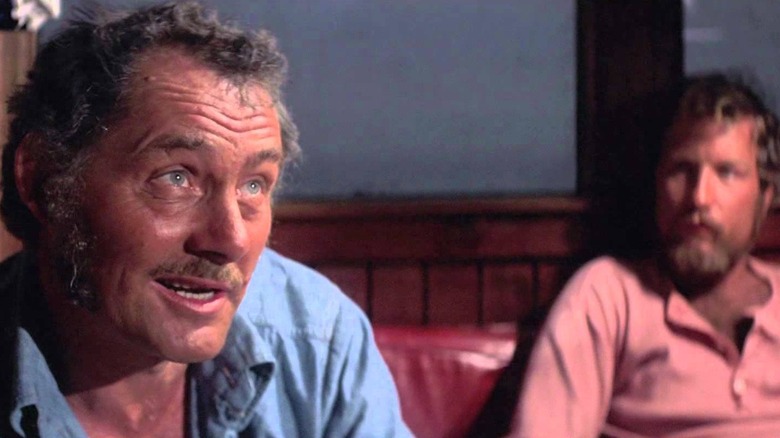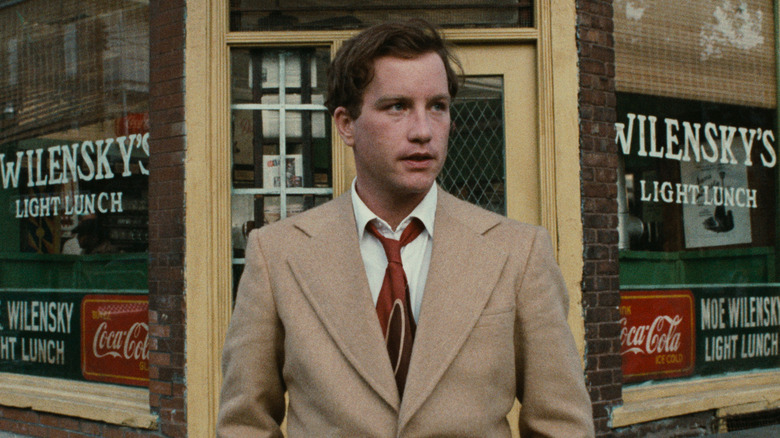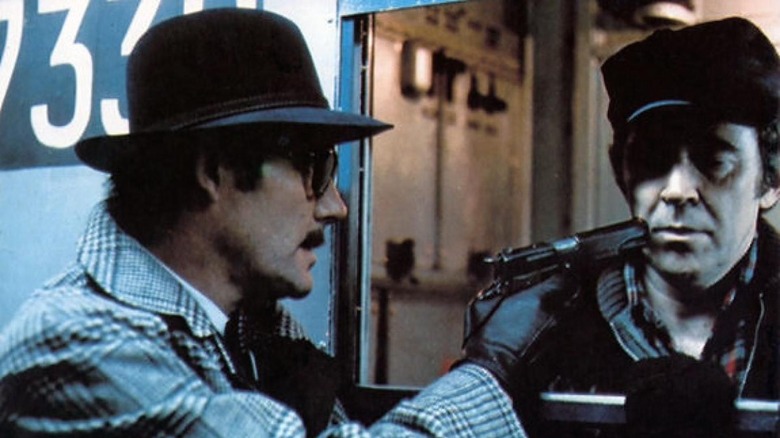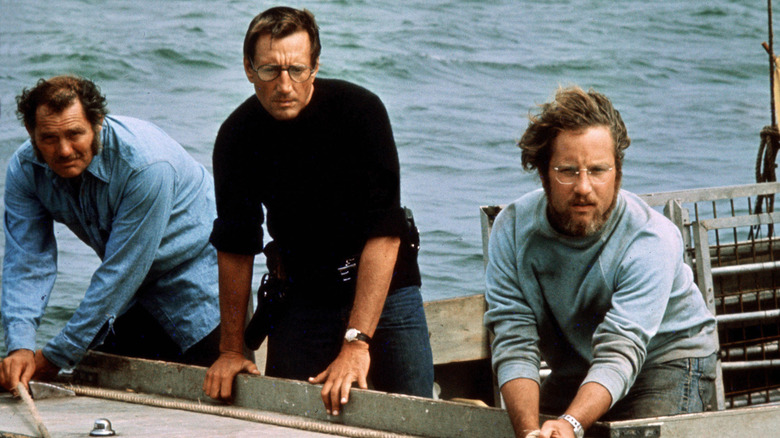Why Richard Dreyfuss And Robert Shaw Had A Contentious Relationship While Filming Jaws
Richard Dreyfuss didn't really want a part in "Jaws" at first. He was convinced that his latest picture, "The Apprenticeship of Duddy Kravitz," would be a big success, and turned Spielberg down for the role of Matt Hooper. Twice.
Then he actually saw his performance in the film and felt it was so bad that it could potentially end his career. "I thought that I had given the worst performance in the history of celluloid," Dreyfuss told CBS News. So he chased down Spielberg and begged for the job on the killer shark movie, and not a moment too soon. Nine days before cameras rolled on "Jaws," the roles of enthusiastic oceanographer Hooper and surly old sea dog Quint were still not cast.
The shoot of "Jaws," Spielberg's second feature film, is the stuff of legend. Somehow, the tenacious young director corralled all his disparate elements to produce the first true summer blockbuster, one that terrified audiences and still holds up as one of his best films in a career spanning almost fifty years. It's my personal favorite of Spielberg's films, and one of the things that keeps me coming back is the fantastic chemistry between its three leads, Roy Scheider, Richard Dreyfuss, and Robert Shaw.
Yet for all the memorable onscreen chemistry, stories emerged that Dreyfuss and Shaw enjoyed a far less rewarding relationship when the camera wasn't rolling. How bad was their feud? Let's first take a look at the contenders...
Richard Dreyfuss was an up-and-comer
Richard Dreyfuss never lacked confidence, even at an early age. He was once thrown out of an audition as a teenager for yelling at a director who kept him waiting (via CBS News):
"And I blew. And I really blew. And Milt [Hamerman] calmed me down, brought us in. And he said, 'Okay, Richard, tell us what you've done.' And I said, 'No. (laughter) No. Milt, you know what I've done. I've been here 1,000 times and it's insulting. The whole thing is insulting, the way you treat us.' 'Get out.'
As his career progressed from TV appearances ("Bewitched") to bit parts in movies ("The Graduate") to acclaimed lead roles (Best Actor Golden Globe nominee for "American Graffiti") and beyond, he developed a reputation for arrogance, an accusation he has rarely bothered to deny.
When it came to his performance as Hooper in "Jaws," the arrogance was part of the charm. He's an enthusiastic but cocksure young oceanographer who arrives on Amity Island to offer his expertise when a killer shark starts chowing down on swimmers. While he is friendly with Brody, he doesn't defer to the older man at all, and e comes across as arrogant at times. Hooper shows far less respect to Quint, who responds by writing the oceanographer off as a landlubber. Rather than be cowed by the intimidating old sailor, Hooper engages him in a game of oneupmanship.
This dynamic between the two fictional characters found a perfect mirror in the relationship between the actors, although they started off on a better foot than Hooper and Quint. Dreyfuss was a fan of Shaw's performance in a BBC adaptation of "Hamlet" and was full of praise (via The Daily Record):
"I knocked on his door, he opened and I said, 'Your Claudius was the greatest Claudius ever, it justified the entire play.' And he said, 'C'mon in here and have a drink.' We bonded like crazy."
Robert Shaw was the old pro
Robert Shaw had been around for a while by the time he took the role as Quint, the demented shark hunter. Making his film debut shortly after World War II, he went on to play one of the few SPECTRE henchmen who could pose a serious threat to 007 in "From Russia With Love," lost out on an Academy Award for "A Man For All Seasons" to his later drinking buddy, Walter Matthau, and played the villain opposite Paul Newman in "The Sting."
He was a tough character from a tough upbringing, inheriting alcoholism from his abusive dad, who committed suicide when Shaw was just 12 years old. As a talented actor of stage and screen, he became another of those heavy-boozing thespians like Richard Burton, Peter O'Toole, and Richard Harris.
Shaw's son, Ian, has an interesting perspective on his dad's drinking (via Irish Times):
"I feel that generation, especially the more working-class actors like Richard Burton, had a little discomfort with the profession in terms of putting on tights and make-up. So their way of asserting their masculinity was to be hard drinkers, the sort of Viking method of proving themselves."
Shaw was a reputed stage actor, playing Shakespeare with the Old Vic in London, and also an author of several novels; "Situation Hopeless... But Not Serious" was adapted into a film starring Alec Guinness. With his experience and hard-drinking temperament, he wasn't about to let some arrogant kid like Richard Dreyfuss off easily.
Shaw's drinking on the job could sometimes get out of hand. During "Jaws," he suggested a little tipple to set the right tone for the USS Indianapolis scene. He ended up getting so drunk that he was unable to complete the take (via Entertainment Weekly). Shaw talked about his tippling during an on-set interview when asked how he psyched himself up between scenes:
"Well.. scotch, vodka, gin, whatever, we all have different methods. I do tend to drink when totally bored, Roy does exercises... and Dreyfuss talks... just talks interminably."
Dreyfuss and Shaw disagreed about plenty of things
Although Dreyfuss and Shaw initially got on well, things changed when it came to getting into character (via Bio.com):
"He was an enormous personality, and he radiated it, and in private he was the kindest, gentlest, funniest guy you ever met. Then we'd walk to set, and... he was possessed by some evil troll who would make me his victim."
Roy Scheider believed it was Dreyfuss's arrogance that sparked the so-called feud:
"He [Shaw] really thought Dreyfuss needed a slapping down... young punk with no stage experience..."
Dreyfuss himself later downplayed any talk of a feud between them (via Daily Record):
"It's clearly not true, and where that started I don't know, but trust me, Robert Shaw wouldn't countenance that idea of a feud, forget it."
The big incident that seems to be the main source of the feud story also involved drink. Dreyfuss explained:
"He was walking down the gangplank holding a drink in his hand and said, 'Richard, help me out here.' I said, 'Do you really want my help?' He said he did and I took his drink and I threw it in the water. Every drinker on that crew went 'ooooh' and then he got his revenge by taking the fire hose and pointing it at my face. I lost my sense of humour and that lasted about an hour."
Spielberg also tells a story about their on-set rivalry that seems enlightening:
"Robert would basically humiliate Richard into taking a chance. For instance, Robert would say 'I'll give you a hundred bucks if you climb to the top of the mast and jump off into the water.'"
With a natural tension between Quint's "working class hero" and Hooper's "city boy," maybe part of it was an experienced actor taking the reins and doing what he thought best to get the most out of his younger co-star. If everything I've read about Shaw is true, rattling the arrogant "young punk" at the same time was probably a nice little bonus. Even though there isn't really a clear victor in this battle of big screen talents, it's the audience who ended up winning.



